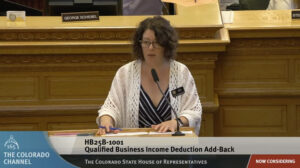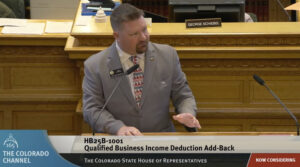Of the four special-session bills that seek to raise revenue by rolling back tax breaks, none will contribute more to state coffers — about $100 million annually — than a proposal to permanently decouple Colorado from a federal tax deduction on closely held companies.
While House Bill 1001 may not be mobilizing as much opposition as others in the quartet — that honor likely belongs to the proposed repeal of the regional- and home-office insurance tax reduction — it stands out for the amount it will cost businesses. And, as Republicans in the Colorado House have showed over the past two days, it stands out too for the concern it is triggering over how much it could reduce the state’s already lagging competitiveness in attracting, retaining and growing jobs.
Sponsored by Rep. Emily Sirota, D-Denver, HB 1001 specifically targets an eight-year-old federal tax break that permits owners of closely held businesses — limited liability companies, S corporations and sole proprietorships — to deduct 20% from their tax bills. Passed in the 2017 Tax Cuts and Jobs Act and made permanent in this year’s House Resolution 1 (the “One Big Beautiful Bill”), the deduction is meant to level the playing field for those companies’ owners with typically larger C corporations, which pay a 21% rate.
State legislators decoupled state law from federal policy in this area in 2020, meaning that owners of these companies must add back to their federal taxable income the 20% deduction they got in order to calculate the base earnings on which the state will tax them. The Legislature then extended the decoupling in 2021 through the end of this tax year, and HB 1001 would make the decoupling permanent.
Why these businesses’ tax break is being targeted
The state did not decouple the deduction entirely, as it’s exempted anyone reporting income of less than $500,000 as a single filer or $1 million as a joint filer, meaning those business owners don’t have to add the deduction back to wages on state forms. Legislators set those thresholds because they wanted to preserve the full weight of the tax break for smaller businesses but not for higher-income LLCs and others who make up the minority of owners claiming the tax break but also the majority of total tax savings.
Gov. Jared Polis and Democrats chose to push continued decoupling of what’s known as the qualified-business-income deduction in part because affected businesses already weren’t getting a state tax break, making it less a change in policy than an extension of one.

Colorado state Rep. Emily Sirota explains her House Bill 1001 on the chamber floor on Friday.
But also, as Sirota said Tuesday, they did so because tax breaks created and extended in H.R. 1 are the reason Polis called the special session to fill a $783 million budget shortfall in this fiscal year caused by revenue reductions reflected in state policy. And because most of those tax breaks go to corporations, it is only right that changes in state tax law will require businesses to help fund the state services that otherwise would be cut, she said.
“What we are saying is that if corporations are going to get about 80% of the breaks from this bill that is gutting health care and food stamps … companies and the wealthy should pay their fair share,” Sirota said during debate. “I don’t know about you, but for my constituents, folks who are earning half a million to a million dollars a year are wealthy.”
Defense of “rich” LLCs
Republican legislators pushed back on the idea that most owners and co-owners of LLCs and S corporations are wealthy. And they also argued that regardless of how one defines wealth, taking money away from those businesses will cause them to slow their rates of growth and job creation, and those impacts will spiral throughout the economy.
Rep. Stephanie Luck, R-Penrose, noted that when owners of these closely held companies file their taxes, they do so as individuals and add gross income made by the company — meaning that what they make funds company expenses as well as take-home pay. Thus, million-dollar earners may be profiting far less as they use the income to grow business and create jobs rather than live richly, she said.
“This is billed as taxing the rich — those big, bad rich people,” said Luck, who is looking to open her own ice-cream shop. “I’m not saying that $500,000 is inconsequential. I’m just saying: Don’t get in your mind that these people are putting that money in their pockets.”
Will bill slow job growth?
Beyond the debate about exactly who is being asked to pay these taxes, though, is the question of what signal this sends to entrepreneurs and business owners who are considering growing their companies in Colorado, several Republicans said. And they concluded that the signal is: Your business isn’t really valued here.
Rep. Brandi Bradley, R-Roxborough Park, noted that Colorado lost jobs last year while all its adjacent states gained jobs, according to the Bureau of National Statistics. And while national employment grew 2% between 2023 and this year, it increased only 0.6% in Colorado. Add those figures to numbers from a Colorado Chamber of Commerce-funded study showing that the Centennial State has the sixth-highest number of regulations, and it becomes clear why its economy is lagging as compared to its neighbors, she said.

Colorado state Rep. Ron Weinberg criticizes House Bill 1001 during a speech on Friday.
Rep. Ron Weinberg, a Loveland Republican who owns a technology-solutions company, noted that the federal tax break was passed to encourage investment, hiring and growth among smaller businesses and to help them as they compete against large corporations. Preventing them from getting the same state tax help that they are getting federally gives them less incentive to grow jobs, which is needed to lift people out of poverty and reduce need for the Medicaid and food-stamp spending over which bill sponsors are worrying.
“Let’s not forget who they are. They are owners of construction companies who employ dozens or hundreds of workers. They are owners of restaurants who have been at it for decades,” Weinberg said. “When businesses have the option to expand, move or hire, this is one more reason to leave Colorado behind.”
Tax break is at heart of several controversial bills
Rep. Ryan Gonzalez, R-Greeley, said HB 1001, which would add $45.9 million back to the budget this fiscal year and $95.5 million next fiscal year, is part of a bigger trend of bills and justification for tax-policy changes that show a “disdain for corporations.” Other proposed changes, all of which passed House committees on Democrat-led party-line votes Thursday, include:
- HB 1002, which decouples state policy from a federal tax break on income from foreign sales tied to assets like patents and also adds five countries to the list of foreign tax havens, requiring businesses to include pre-tax income from those companies in Colorado filings;
- HB 1003, which eliminates a 66-year-old reduction on premium taxes for insurance companies that have at least 2.5% of their national workforce in Colorado — the so-called regional- and home-office tax credit; and,
- HB 1005, which eliminates a 4% vendor fee given to smaller retailers that calculate and submit their sales taxes to the Colorado Department of Revenue.
Rep. Yara Zokaie, D-Fort Collins, said HB 1001 and other bills are about defining Colorado’s priorities — namely, whether “wealthy business owners” should get to deduct 20% from their tax bills when teachers and hourly service workers don’t. Such conversations become more important when the state is struggling to find money for basic services, she added.
“This isn’t about punishing success. It’s about basic fairness,” Zokaie said. “It means you don’t get a special tax break. We don’t give special tax breaks to people in the fast-food industry.”
HB 1001 received preliminary approval from the House on what appeared to be a party-line vote Friday. It must get final approval from the House on Saturday before moving onto the Senate in a special session that is expected to run through early next week.
